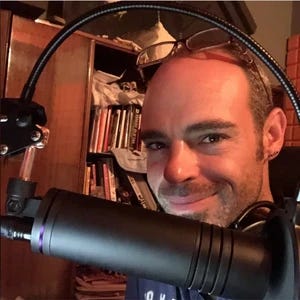Dear subscribers
This week’s EDDi Extra is a solo feature.
In partnership with the Outstanding Schools Europe Conference, we are delighted to feature a piece by Dr Elise Ecoff, Group Education Director, Nord Anglia Education.
Dr Ecoff will be speaking at the conference on ‘Looking Ahead – What Kind of Schools Do We Need for the Future?’, her article (below) introduces that theme. As the play button above hints, it’s also available in audio form via Jason Lasky - hit play to listen, scroll down to read.
For those interested, tickets are still available for the Outstanding School Europe Conference - details here.
We’ll be back next week with a traditional academic digest edition, including an exciting collaboration with ‘Talk Pastoral’ - watch this space!
Until next week…happy reading.
EDDi
Unbounded Classrooms
FEATURE ARTICLE: Outstanding Schools Europe Conference
WORDS: Dr Elise Ecoff
AUDIO: Jason Lasky
“The more complex the world becomes, the more creative we need to be to meet its challenges.” Sir Ken Robinson
Over the past two years our world has been in one of the most complex times in modern history. Education, as we’ve traditionally known it, has been upended and we are no longer able to rely on the physical space of the school to educate our children. Instead, the classroom has expanded to fill virtual spaces. New classroom communities of learning online have become the day-to-day educational experience of our students.
It was the pandemic that pushed us into a virtual space, but in future, no matter what the disruption - storms, snow days, strikes - we now have access to the same solutions.
The prompt for this shift was a crisis and a need for containment, but the potential of these new solutions is liberating. Students can now be educated wherever they are, by teachers anywhere in the world. We no longer need to be in the same location to be educated together.
The idea of a school without walls is not new.
Advocates of experiential learning have long seen the wider world as their classroom. However, EdTech has added a new layer to this concept by providing a virtual world that can enhance opportunities for learning and collaboration. Now, as we look ahead to beyond the pandemic, there are further opportunities for creative solutions that widen our understanding of what education can be and where it can, and should, happen. A chance to create classrooms that bring the world to our students, and our students to the world.
This model of unbounded classrooms – in effect a global campus where students and teachers can collaborate freely – has emerged as a creative response to a complex, fast-changing crisis but now has the potential to enhance the educational experiences of everyone who learns or works in schools. Virtual connections establish global relationships: students collaborate across countries on shared projects; teachers learn from classroom practice in different regions; school leaders share insights and solutions with a global pool of supportive peers.
Whilst the potential for new technologies is promising, it also needs to be recognized that for many students, learning online was not ideal. Students who did not have access to the internet, adequate devices or the support and resources they needed, found learning during the pandemic extremely challenging. Families struggled to balance work, home and school priorities. Everyone missed the physical community of the school. For most schools, the move to online learning was sudden and unplanned and we have all learned lessons about what we value in education.
Yet, we have also learned about the adaptability and flexibility of our teachers who responded rapidly and upskilled in Edtech in real time. We’ve seen our educators demonstrate they can use new technologies to provide academic challenge and wellbeing opportunities, to create focused small group math lessons and worldwide sporting challenges. We have seen a willingness from teachers to develop new resources and educational approaches, and to learn from each other in professional development online.
We’ve also seen that our students can rise to the challenge of a hybrid education with impressive resilience.
In fact, it has been our most vulnerable who have sometimes benefited most, with virtual schooling providing opportunities for new forms of participation. Students who struggle with anxiety or shyness in a face-to-face community can thrive in online spaces. Others have benefitted from a chance to take ownership and exert a greater sense of agency over how they organize their learning outside of school. Global data shows us that educational attainment during the pandemic has been uneven, but we can also learn from the bright spots that show us how, in a time of educational crisis, many students have continued to achieve and thrive.
As we now look towards an educational future beyond the pandemic, it seems fitting to use the technology that helped us during isolation to foster greater connection and closer communities. We live in a complex world, but one that is rich in potential for collaboration between students, between teachers, schools and universities, in virtual spaces and physical classrooms. We have an opportunity to redraw the boundaries of education, collapse the walls of the school and reconsider the limits of our students’ learning.
It is a challenge that demands a brilliantly creative solution, or mosaic of shared solutions, that will redefine education and our students’ vision of what they will be able to achieve.
This article was written by Dr Elise Ecoff, Group Education Director, Nord Anglia Education. Join Dr Ecoff at the upcoming Outstanding Schools Europe Conference for the panel discussion ‘Looking Ahead – What Kind of Schools Do We Need for the Future?’
Narration By Jason Lasky (Armenia)
Jason Lasky is a published playwright, lauded theatre director, and 14-year international teaching veteran who holds an MEd in IB Education and an MFA in Writing for Stage and Screen. He is the co-Artistic Director of J.Lasky Productions, a grant-winning international theatre company, and the founder of J.Lasky Voices, his voiceover production studio.
He currently resides in Dilijan, Armenia with his family.
Jason can be contacted on Twitter, LinkedIn or via his website. A sample of his voice work is here.
Jasonlasky.com
JLaskyVoices.com
EDDi
EDDi digests educational views and peer-reviewed educational research - we keep you current with research-informed practice, saving you time and money.













